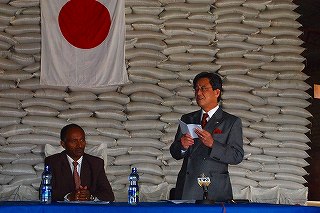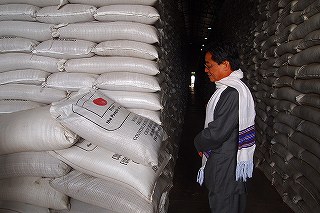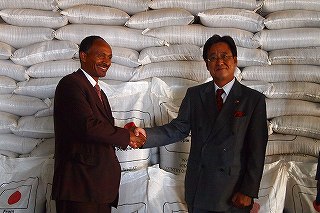| |
 |
An official handing-over ceremony between the Governments of Japan and the Federal Democratic Republic of Ethiopia for food aid took place on 01September 2011 at the Ethiopian Grain Trade Enterprise [EGTE] warehouse located in the Sarris area. H.E. Mr. Hiroyuki Kishino, Ambassador Extraordinary and Plenipotentiary of Japan to Ethiopia and Ato Birhane Hailu, General Manager of the EGTE conducted the ceremony.
On the occasion, H.E. Mr. Hiroyuki Kishino said that 14,444 metric tons of wheat was procured under the Japanese Food Assistance Programme at the cost of 550 million Japanese Yen [about 124 million ETB at the current exchange rate]. The program was implemented based upon the grant agreement signed between the two governments in November last year.
H.E. Mr. Ambassador continued by saying that the primary aim of this assistance is to offer support in mitigating food shortages, which is timely as the worst drought to have hit the Horn of Africa in sixty years is also affecting 4.6 million people in Ethiopia. However, this food assistance goes beyond the current crisis because it helps Ethiopia save foreign currency, contributes to the national budget management and stabilizes crop prices in domestic markets through an additional supply of wheat. Japan’s contribution for drought victims in the entire Horn of Africa since the beginning of this year now amounts to 97 million USD and 23 million USD [about 395 million ETB* at the current exchange value rate] for food, food for work for the Ethiopian farmers as well as assistance for refugees living in Ethiopia.
 |
is Excellency also noted that to ensure food security, the Ethiopian Government has designed and operated several mechanisms such as the National Food Security Strategy launched in 1996 from which various best practices achieved in agriculture were scaled up during PASDEP resulting in an increase in crop production. However, due to recurrent drought, which occasionally hits some areas of the country due to the erratic nature of the rainfall, a continuous gap still exists between food demand and food supply at the national level.
H.E. Mr. Ambassador went on to say that in an attempt to address this issue, the Ethiopian Government, in the Growth and Transformation Plan[GTP], has worked out a plan to double the crop production with great emphasis placed on farmers’ training and use of improved agricultural technologies. To achieve the GTP goal in agriculture, concerted efforts are required by both the Ethiopian Government and its development partners. Japan, as a long standing supporter of the agriculture sector, will remain firm to assist the agricultural production and productivity in Ethiopia
H.E. Mr. Kishino also recalled that, since 1983, Japan has extended food assistance under the KR Program to Ethiopia with total funding of 9.583 billion Japanese Yen [about 2.15 billion ETB at the current exchange rate]. Japan has also extended assistance to Ethiopia in agricultural inputs such as fertilizer under the KR II Program since 1985 with total funding of 13.648 billion Japanese Yen [about 3.1 billion ETB at the current exchange rate]. Japan will continue these programs because it believes that supporting efforts to increase food production is more important than just supplying food. Therefore, in line with Ethiopia’s priority to increase agricultural productivity, the Ambassador expressed his feeling that a gradual shift from supplying food to supplying fertilizer, was necessary as a critical element for increasing food production. He also noted that strengthening technical cooperation is also critical to increase productivity, to promote rice cultivation and irrigation, and so on.
 |
H.E. Mr. Kishino expressed his wish that the wheat that was handed-over will be distributed in markets in areas where cereal crop supply is scarce to help improve the livelihoods of residents through access to food and crop price stability. Thus it could make a substantial contribution towards improving the livelihoods of the Ethiopian people. He finally emphasized that Japan is always with Ethiopia for agricultural and rural development.
|
|



